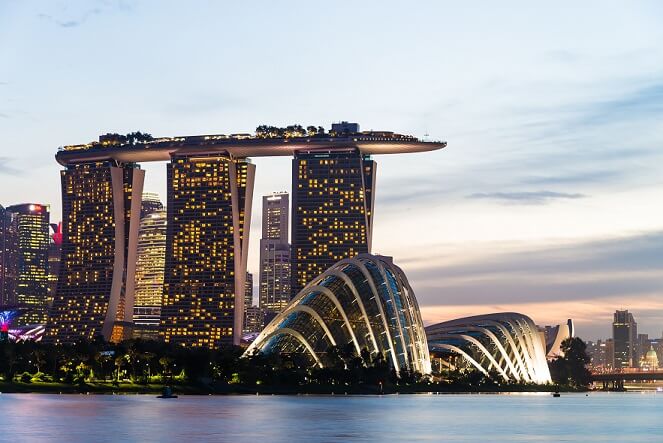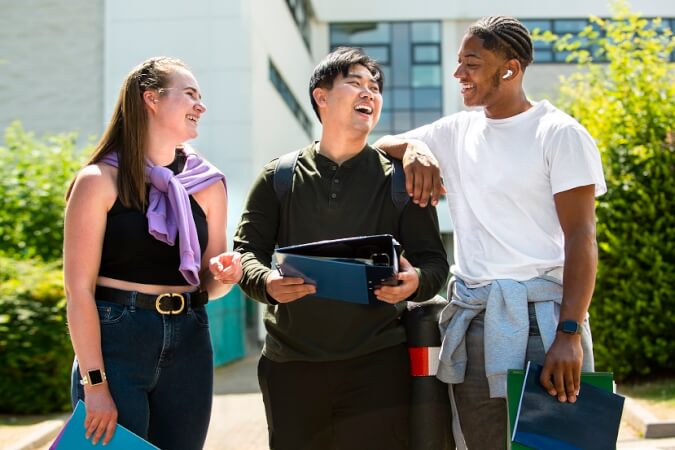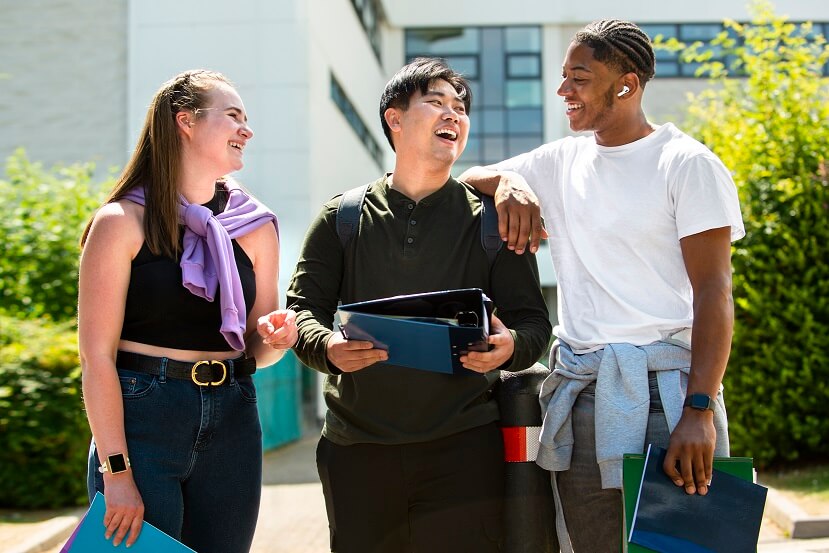Singapore gives you a spark of adventure that takes you from a world-class airport, iconic hotels, to tropical summer vibes. Many international students want to study in Singapore because of its modern teaching tools, research facilities, and top-tier education system that nurtures their entrepreneurship, innovation, and creativity.
As a melting pot of cultures, Singapore’s allure is irresistible and draws students to its stimulating, open,and cosmopolitan city-state and island environment.
Singapore is among the four “Asian Tiger” economies, along with South Korea, Hong Kong, and Taiwan, enjoying rapid economic growth and tourists' attention.

Why study in Singapore?
World-ranked universities
Singapore is a business and education hub with some of its local universities ranked among the best in the world.
Top-ranked passport
According to the Henley Passport Index 2025 report, Singapore’s passport tops the world’s international passport’s relevance.
English is widely spoken
English is used in Singapore, making it easier for communication, except in local homes.
Scholarships
The country has government subsidies that significantly reduce the costs of your education. International students are eligible to apply to the Singaporean Ministry of Education for a tuition grant. More information on scholarships offered can be found here.
Prosperous state
Singapore has a healthy economy, making it an attractive destination for people who want to enjoy a better living experience and earn high wages.
What documents do I need to provide to apply in Singapore?
To apply to a university in Singapore, you will likely be asked to provide some of the following documents:
-
birth certificate;
-
recent photos;
-
your passport or national identity card;
-
one or more reference letters from past employers or teachers;
copies of past diplomas or certificates, including your graduated Bachelor's degree;
-
academic transcripts;
-
letter of intent;
Curriculum Vitae;
-
Some form of proof that you can support your stay in the country during your studies.
Singapore Visa Requirements
Documents Required
You will need the following documents:
· Duly signed and completed Form 14A
· Recent passport-sized colour
· A photocopy of passport biodata page (valid for at least six months from the date of your entry into Singapore)
· A completed Form V39A
· Letter of Introduction for Visa Application (LOI)), which may be issued by a local contact* in Singapore, for an entry visa for business visit.
Application deadlines for Singapore
The deadlines for applying to a Master's in Singapore are usually during the summer (June-July), or in winter (January-February). Some universities don’t have application deadlines, which means you can apply whenever you are ready.
Study in Singapore Frequently Asked Questions
1. Why should I study in Singapore?
Singapore offers high-quality, internationally recognised universities and polytechnics, a safe and multicultural environment, English-medium instruction, strong industry links, and good regional mobility in Asia.
2. What are the benefits of studying in Singapore compared with other countries?
Shorter programmes for some degrees, strong industry ties and internships, competitive costs (often lower than the UK or US), and excellent transport and safety make Singapore an appealing destination.
3. What types of programmes or institutions are available in Singapore?
You can choose from autonomous universities (NUS, NTU, SMU, SUTD, SIT, SUSS), polytechnics, Institutes of Higher Learning, and private education institutions offering undergraduate and postgraduate degrees or vocational programmes.
4. What is the academic reputation of Singapore’s institutions?
Several Singaporean universities rank in the global top 100 and are renowned for excellence in business, engineering, computing, and life sciences.
5. What is the medium of instruction in Singapore?
English is the primary language of instruction across most tertiary institutions in Singapore.
6. Is it easy for international students to adapt to life in Singapore?
Yes. English is widely spoken, and Singapore’s cultural diversity helps students adapt easily. Universities also provide orientation and support services.
7. What are the entry requirements for undergraduate programmes in Singapore?
You’ll need secondary qualifications equivalent to A-levels, IB, or equivalent, plus required grades and subjects for your course. Some schools may request entrance tests or interviews.
8. What are the entry requirements for postgraduate (Master’s or PhD) programmes?
Master’s programmes usually require a recognised bachelor’s degree with good grades; PhD admission often requires a research proposal and supervisor match. Some programmes may need work experience or GRE/GMAT.
9. What documents are needed when applying to study in Singapore?
Commonly required documents include academic transcripts, degree certificates, passport copy, CV, statement of purpose, recommendation letters, and proof of English proficiency (IELTS/TOEFL).
10. When are the intake periods or semesters in Singapore?
Most universities have main intakes in August/September, and some offer additional intakes in January/February. Always check your chosen institution’s calendar.
11. Are there minimum English-language test scores required?
Yes. Universities typically accept IELTS (6.0–7.0) or TOEFL (80–100 iBT), though requirements vary. If you previously studied in English, some institutions may waive this.
12. Can I apply from overseas to study in Singapore?
Yes. Most applications are submitted online from your home country, and universities will help you with the Student’s Pass process if you are admitted.
13. Are there age requirements for international students coming to Singapore?
Generally, no. Universities focus on academic qualifications, though some scholarships may have age limits.
14. Will my foreign qualifications be accepted in Singapore?
Yes, provided they are equivalent to local requirements. Some schools may ask for credential evaluation or additional documentation.
15. Do I need a Student’s Pass to study in Singapore?
Yes. Foreigners enrolled in full-time courses at approved institutions must obtain a Student’s Pass from the Immigration & Checkpoints Authority (ICA).
16. How do I apply for a Student’s Pass in Singapore?
Once admitted, your school registers you in ICA’s SOLAR system. You’ll then complete an online application, upload documents, and pay the required fee before traveling to Singapore.
17. How long does the Student’s Pass application process take?
Processing usually takes 2–4 weeks, but apply at least two months before your programme begins.
18. What are the eligibility criteria for a Singapore Student’s Pass?
You must hold an admission offer from an ICA-approved institution and be enrolled in a full-time course. Part-time and short courses generally don’t qualify.
19. Are short-term courses exempt from needing a Singapore Student’s Pass?
Yes. Courses shorter than 30 days typically don’t require one, but confirm with ICA or your institution.

20. Can I work part-time while studying in Singapore?
Yes, but under strict conditions. Students at approved institutions may work up to 20 hours per week during term and full-time during vacations.
21. Can I stay in Singapore after graduation?
Yes. If you secure a job, your employer can sponsor a Work Pass (Employment Pass, S Pass). You may also apply for a short-term visit pass to job hunt after graduation.
22. Can I transfer schools and keep my Student’s Pass in Singapore?
If you change institutions, you must inform ICA and reapply for a new Student’s Pass. Your current pass will be cancelled upon transfer.
23. What are the typical tuition fees for international students?
Fees vary by programme:
-
Public universities: SGD 20,000–45,000 per year
-
Private institutions: SGD 15,000–35,000 per year
STEM and business courses are usually more expensive. With the pay4Me App, you can make your study in Singapore’s payments.
24. How much should I budget for living expenses in Singapore?
Expect to spend SGD 1,000–2,000 monthly on accommodation, food, transport, and other needs. Your lifestyle and housing choice greatly affect costs.
25. Are scholarships available for international students in Singapore?
Yes. Universities and the Singapore government offer scholarships such as NUS Global Merit Scholarship, SMU International Scholarship, and others based on merit or need.
26. Are there additional fees beyond tuition?
Yes. Expect student service, registration, health insurance, and administrative fees, usually listed in your offer letter.
27. Are tuition fees different for locals and international students?
Yes. Singapore citizens and PRs receive government subsidies; international students pay higher tuition unless granted a MOE Tuition Grant.
28. Can I work to offset study costs?
You can work part-time under MOM regulations if eligible. Unauthorised employment is illegal and may lead to fines or deportation.
29. What accommodation options exist for students?
You can stay in university halls, hostels, shared apartments, or private rentals. On-campus housing is affordable but competitive.
30. How much does student housing cost in Singapore?
-
On-campus: SGD 200–600 per month
-
Private rooms/flats: SGD 800–2,500+ per month depending on location and amenities.
31. How expensive is Singapore compared to other study destinations?
Singapore is pricier than many Asian countries but generally cheaper than the UK, US, or Australia when factoring in shorter course durations and safety.
32. How do I find accommodation as an international student?
Apply early for on-campus rooms. For private rentals, use trusted platforms or your school’s housing office, and avoid paying deposits before signing verified agreements.
33. What cultural or legal norms should I know in Singapore?
Singapore enforces strict cleanliness, smoking, and public conduct laws. Respect cultural diversity and follow local rules to avoid fines.
34. How safe is Singapore for students?
Singapore is one of the safest countries globally, with low crime and excellent public services. Basic personal safety practices are still advised.
35. How reliable is public transport in Singapore?
The MRT and bus systems are efficient, affordable, and student-friendly. You can get concession cards for discounted fares.
36. What is the teaching style like?
Expect interactive lectures, tutorials, and project-based learning. Critical thinking and participation are highly valued.
37. How long does a typical degree take in Singapore?
Undergraduate degrees last 3–4 years, while master’s programmes usually take 1–2 years.
Read: China's K Visa vs US H-1B Visa
38. Are internships part of the curriculum in Singapore?
Yes. Most universities include internships or practical attachments, often in partnership with leading companies in Asia.
39. How difficult are courses in Singapore?
Courses are rigorous, but universities provide support through academic advising, tutoring, and mentoring. Success depends on consistent effort and time management.
40. What support services are available for international students?
Universities offer orientation, counselling, visa help, language support, and student mentorship programmes to ease adaptation.
41. Can I change my major after enrolling in Singapore?
Yes, though it depends on faculty approval and course availability. Early changes are easier to process.
42. What if I fail a course or want to repeat a year?
You can usually retake failed modules or repeat the academic year, but there are GPA and progression policies — check your school’s handbook.
43. What are the job prospects for international graduates in Singapore?
Graduates can find opportunities in finance, IT, logistics, engineering, and biomedical sectors. Networking and internships improve employability.
44. Can I stay in Singapore to work after graduation?
Yes, with a valid job offer and a work visa (Employment Pass, S Pass, or Work Permit). Some students remain for short-term job searches under a Visit Pass.
45. How do I switch from a Student’s Pass to a Work Pass in Singapore?
Your employer applies for a Work Pass through the Ministry of Manpower (MOM). Approval depends on salary, qualifications, and role type.
46. Is a Singapore degree recognised globally?
Yes. Degrees from Singapore’s leading universities are internationally recognised and highly regarded by employers worldwide.
47. Can international students pursue postgraduate studies in Singapore?
Absolutely. Singapore’s universities offer world-class master’s and PhD programmes with strong research opportunities and scholarships.
48. Can I transfer to another country after studying in Singapore?
Yes, many institutions abroad recognise Singaporean credits and degrees, though transfer rules depend on the receiving university.
49. Do international students have equal job opportunities?
Employers focus on skills and visa eligibility. Building local networks and gaining internship experience can improve your chances.
50. What are my legal responsibilities as a student in Singapore?
Maintain a valid Student’s Pass, respect work limits, obey all laws, and report changes (address, school, course) to ICA. Non-compliance can lead to penalties or deportation.
Read : How to Study in Sweden Frequently Asked Questions




